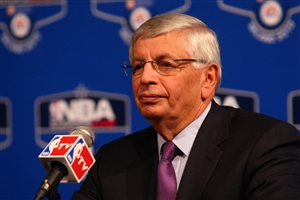
2016 Class of FIBA Hall of Fame: Juan Antonio Samaranch
MIES (2016 FIBA Hall of Fame) - The late Juan Antonio Samaranch, the President of the International Olympic Committee (IOC) for more than two decades, is being honoured as an inductee of the 2016 Class of FIBA Hall of Fame on 27 August at the House of Basketball in Mies, Switzerland.
The Spaniard will enter as a contributor, having served as the seventh IOC President between 1980 and 2001, becoming the second-longest serving President in the history of the IOC. His service was only eclipsed by Pierre de Coubertin, the founder of the modern Olympics. When Samaranch left his seat and handed over to Jacques Rogge, he became an Honorary IOC President for Life.
One of his main legacies was as a central figure in enabling access for professional athletes to Olympic competitions. Famously this involved working with his fellow 2016 Class of FIBA Hall of Fame inductee and former NBA Commissioner David Stern, as well as FIBA Secretary General Emeritus, Borislav Stankovic to facilitate the arrival of the USA 'Dream Team' to the 1992 Olympic Games. It proved to be one of the great Olympic stories and helped to push basketball as a sport to new audiences and markets around the world.
There are few figures past or present involved in the Olympic Movement who can lay claim to such an influential and impressive resume as Samaranch. A former diplomat who also once took on the role of Spanish ambassador in Moscow, he has been credited with being behind the transformation of the IOC so it was able to establish and promote the Olympics in a way that had never been done before.
His deal-making abilities, desire to bring both Federations and people together, as well as his skilled and collaborative approach, were credited with being some of the influential factors behind the unprecedented growth of the Olympic Games during his 21-year tenure.
He intensified the IOC's support to organise Paralympic Games as of the 1984 Winter Games and was also in favour of the feminisation of the Olympic Movement. During the 1981 Baden-Baden Congress, he gained permission for women to become members of the IOC and then became involved in various initiatives to promote women and sport.
Samaranch also made doping a priority by launching extensive research and control programmes, working closely with the World Anti-Doping Agency in 1999 via the IOC Medical Commission to extend its scope of action. It was also was under his Presidency that the Summer and Winter Games were organised every two years, instead of in the same year - though still respecting the traditional gap of four years.
Among his many other accomplishments were his many activities to promote peace through the Olympic Movement. He managed to include both the National Olympic Committee of the People's Republic of China and that of Chinese Taipei. He contributed to the abolition of apartheid in South Africa and the reintegration of the country in Olympic competitions, visited Sarajevo during the civil war to express Olympic solidarity; and, thanks to his determination, the two Koreas marched under the same flag at the Opening Ceremony in Sydney in 2000.
In June 1993, the inauguration of the Olympic Museum which captures and celebrates the spirit of modern Olympism and the work of his career, crowned his Presidency. It came two years after Samaranch had received the distinguished title of Marqués from the King of Spain for his involvement in the Olympic Movement.
Now the far-reaching legacy of Samaranch will also include a place in the FIBA Hall of Fame.
As the Samaranch family cannot be present for the induction ceremony of the 2016 Class of FIBA Hall of Fame, Mr Samaranch will officially be inducted with the 2017 class.
FIBA
















